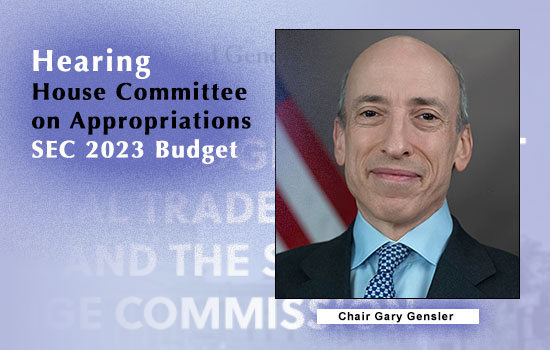Fiscal Year 2023 is in focus today for U.S. Securities and Exchange Commission Chair Gary Gensler who is presenting his group’s budget for next year to the House Committee on Appropriations chaired by Rep. Rosa DeLauro (D, CT).
The live hearing began at 10:30 am ET on Wednesday, May 18. Chair Gensler will also be answering questions with U.S. Federal Trade Commission chair Lina Khan, who will discuss her commission’s budget for the next fiscal year.
As outlined by the SEC’s FY 2023 budget justification in March, points of discussion with the House committee as it relates to crypto includes:
-
- Staying ahead of investor protections with more full-time employees for SEC’s Enforcement (ENF) division.
- Continuing to grow the Investment Management (IM) division which approves and regulates ETFs and other financial vehicles which may involve cryptocurrencies.
- Coordinate across the U.S. government and with international partners on applicable policy decisions related to integration and use of distributed ledger technology in a securities context.
See the on-demand video stream of the hearing:
There is no member of the Congressional Blockchain Caucus on House Appropriations.
Live blog …
Congressman and Ranking Member Steve Womack (R, AZ) expresses reservations about increases by both FTC and SEC in his opening statement. He also echoes a popular refrain among some members of Congress who find the SEC’s conduct as it relates to cryptocurrencies as narrowly focused on enforcement, at best.
The opening statement by Chair Gensler is 5 minutes in length and followed the FTC’s Khan. Beginning with a disclaimer that his opinion does not reflect the opinion of all SEC commissioners, as well as noting with a giggle about the interest in “yes, cryptocurrencies” among other areas the SEC oversees, Gensler makes the case in his statement for ensuring that the SEC is adequately resourced. He reminds committee members that his budget is “fully budget neutral” meaning: the SEC budget doesn’t compete with other budgets from other areas of government. (Note: When the SEC enforces, it collects fines and therefore generates revenue.) He stresses the “gold standard” which the U.S. financial markets maintains in the world.
Rep. Womack in his questioning of Chair Gensler about cost benefit analysis identified “so many rule-makings underway.” Gensler talked about how the SEC uses its mandate including capital efficiency and capital formation among for rule-making. Gensler stresses how the SEC uses 2 months heads-up on its website for the capture of public feedback. He says that investors get to decide what’s important to them.
Gensler notes that his agency is still trying to recover from SEC employees being recruited away from his commission and get back to 2018 levels. The SEC is about 6% lower than it was at that time says Chair Gensler.
Taking criticism from Rep. Joyce (R, OH) that his agency has only seemed interested in enforcement, rather than capital formation, for example, Gensler responds that the SEC can lend a role in understanding risk and he says he’s “neutral” and public input is important.
Regarding the 28 rule-making questions with which the SEC is currently dealing, a Congressman asked how the SEC staff handles the volume. Chair Gensler said there are rule-making units across different departments of SEC with some openings today. Gensler said his Commission has not expanded the employee number in that regard.
Comment periods required by Dodd-Frank are less that previous SEC Chairs claims the congressman, and Chair Gensler disagrees and responds that the SEC endeavors to put something up for 60 days but says it gets slowed down by government partners who update the website. Still, they extend comment periods depending on when a site update (the comment period information) gets uploaded.
Rep. Brenda Lawrence (D, MD) asked about protections for minority investors who she said who have “the most to lose” as it relates to cryptocurrencies. Gensler said she’s right that it’s a highly speculative area in spite of some innovations. Gensler believes that many token offerings should not be “lying” – need more disclosure – and should be registered with the SEC. He said they will use their enforcement tools and asks that crypto companies come to the SEC in a pre-emptive manner. Rep. Lawrence emphasized the need for more regulation.
Rep. Womack followed up with more questions on crypto who noted that 10 years of innovation in crypto and there still is a lack of adequate guidance from the SEC. Chair Gensler gives the sense that his agency is not staffed enough to deal with all of the crypto issues. He emphasized the need to identify many of the tokens as securities and making issuers (like previous owners of orange groves in Florida, and an ostrich farm in Texas who floated speculative investment opportunities) be transparent on their offerings. Gensler grudgingly admits that Bitcoin “maybe” is a commodity token and under the CFTC’s jurisdiction and that “crypto exchanges should come in register [with the SEC].”
On more money for full-time employees, Rep. Joyce questioned why there are no clear rules from the SEC on crypto. Chair Gensler said there are clear rules: disclosure. And if it’s an exchange, it needs to register with the SEC: “These exchanges are trading against their customers.”
On benefits of blockchain technology to finance, Gensler noted his MIT background and invoked Satoshi Nakamoto’s core principles saying that blockchain had the power of efficiently moving value on the internet and avoid double spending. The actual use of blockchain technology is limited, he said. He says few have adopted blockchain technology due to cost and the transparency of records which is introduced.
The hearing ending at 11:28 ET – approximately 88 minutes in length.

